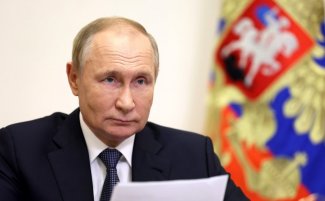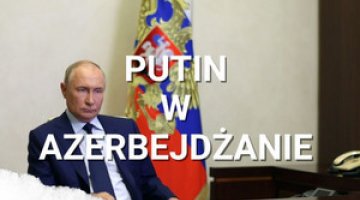Russia: renewed blockade of Ukrainian grain exports by sea

On 29 October, explosions occurred at the Russian Black Sea Fleet base in Sevastopol, most likely the result of an attack using unmanned surface vehicles (USVs) in the form of explosive-laden speedboats. The incident was reported by Moscow – damage was caused to a minesweeper and port infrastructure. At the same time, Russia accused Ukraine and the West (‘British specialists’) – reporting that the hostile USVs were launched in the Odesa area from one of the ships exporting agricultural products from Ukraine and were partly moving in the security zone designated for the ‘grain corridor’. According to unconfirmed reports, three Russian ships armed with Kalibr missiles used to attack Ukrainian infrastructure were damaged, including the flagship frigate ‘Admiral Makarov’. The Ukrainian side did not acknowledge the attack, with its representatives suggesting, among other things, that the explosions were caused by enemy activity.
In the wake of the incident, Russia’s Ministry of Defence announced the suspension of its participation in the agreements on the export of Ukrainian grain on the Black Sea. The two ‘mirror’ agreements – between Turkey, the UN and Ukraine and between Turkey, the UN and Russia – were concluded on 22 July for a period of 120 days (until 19 November), with the possibility of extension by the approval of all parties. The arrangement, which has been in place until now, allowed the export of agricultural products from the three Ukrainian ports on condition that the vessels were inspected by representatives of all the participants in the agreement (including Russia). According to Ukrainian information, less than 9.3 million tonnes of agricultural commodities, primarily maize (3.4 million tonnes) and wheat (2.4 million tonnes), have been exported via the sea corridor throughout the duration of the agreements.
The UK defence ministry firmly rejected Russian accusations of involvement in the attack on the Black Sea Fleet. President Volodymyr Zelensky, meanwhile, stated that he expected a ‘tough response’ from both the UN and the G20. Ukraine’s Foreign Minister Dmytro Kuleba considered the rationale for exiting the agreement to be contrived, and the Foreign Ministry accused Moscow of acting to destabilise global food security.
In response to the renewed blockade of agricultural exports from Ukraine by sea, Western countries and structures (EU, US, NATO) called on the Kremlin to resume the grain agreements and end the war as soon as possible. In addition, Turkey and the UN have entered into talks with Moscow and Kyiv to unblock the corridor. As a result of these negotiations, ships already present in the Black Sea are expected to fulfil their mission. The Ministry of Infrastructure of Ukraine reported that 12 vessels carrying 355,000 tonnes of food departed from Black Sea ports on 31 October.
Commentary
• If the attack on the Sevastopol base and its aftermath are confirmed, it will be the biggest Ukrainian success to date in the clash with the Black Sea Fleet. While the sinking of the missile cruiser “Moscow” in May was of great symbolic significance, it remained without military impact. Designed to destroy large ships, the “Moscow” had no opponent on the Ukrainian side, and due to its lack of suitable armament, it did not participate in missile attacks. Damage to Kalibr missile-carrying vessels, including the Project 11356M frigate (of the Admiral Grigorovich-class), at least periodically reduces the Russian strike potential by 24 missiles in a single salvo. The strike on the Sevastopol base is also the first recorded use of USVs in military action.
• The attack on the ships only serves to provide Moscow with an excuse to hold Kyiv and the West allegedly responsible for the rupture of the grain agreements. The Kremlin has already made it clear on a number of occasions since September that the way the agreements are being implemented does not satisfy it, and has sought reasons for not renewing them. Among other things, Russia has accused Ukraine – untruthfully – of diverting grain primarily to the markets of Western countries rather than to the poorest countries in Africa and the Middle East. It also complained about the West’s maintenance of sanctions targeting Russian grain and fertiliser exports (officially, no such restrictions are in place, but international business takes a hands-off approach to cooperation with Russian entities, which raises transaction costs and lengthens their time). The Kremlin even tried to link the attack on the Crimean bridge to grain exports – it claimed that the detonated explosives could have been taken out of Odesa on a ship carrying agricultural crops.
• The real goal behind Russia’s suspension of the grain deal is to put pressure on key Western states as to get the authorities in Kyiv to halt hostilities and start peace negotiations based on Moscow’s political and territorial demands. The Kremlin is also trying to force a halt or at least a reduction in Western military support to the invaded state. It is attempting to achieve this in two ways. The first is to increase Ukraine’s economic difficulties by depriving it of income from food exports. The ‘grain corridor’, as it was before the Russian aggression, has become the main route for selling Ukrainian agricultural produce abroad – in October, more than 60% of food was shipped this way. Alternative routes (rail and road to EU countries and Danube ports) are not able to completely replace the Black Sea ports. The renewed blockade of the latter will further aggravate the already very difficult logistical situation at border crossings and the financial condition of agricultural enterprises, which have again lost the possibility to sell a significant part of their production outside. Moscow’s second tool is to deepen the global food crisis, which would result in increased illegal migration to Europe. The destabilisation of the global food market – as well as the nuclear and gas blackmail, which has so far failed to produce expected results – is part of Russia’s war against Ukraine and the West. The Kremlin has, in fact, been sending signals about its readiness to talk with both sides since the beginning of the Ukrainian counter-offensive. Yet in doing so, Russia remains unwilling to make any concessions, including the withdrawal from occupied territories and putting a halt to the shelling of Ukrainian civilian infrastructure, including critical ones. Moscow is primarily concerned with gaining time to equip its army and train its soldiers.
• Russia’s agreement in July to export Ukrainian grain by sea was largely a gesture to Turkey and countries of the Global South. Indeed, for the Kremlin, cooperation with countries outside the Western coalition is crucial for stabilising its economy and circumventing sanctions. Moscow also counted on backing of the Global South in votes held at the UN. In principle, however, the grain agreement has not gained it any new allies, while its rupture and further destabilisation of the market could deal a serious blow to these countries and negatively affect Russia’s image in the region. The Kremlin is unlikely to succeed in convincing these countries that Ukraine and the West are to blame for the termination of the deal. It is therefore possible that it will enter into negotiations for its reinstatement in order to demonstrate its goodwill, hoping for an easing of Western restrictions.
• For Ankara, the ‘suspension’ of the agreement brings with it a serious political challenge. According to a communiqué from the Turkish Ministry of Defence, inspections of the vessels will continue until 31 October. The problem, however, are the remaining vessels that stand in the roadstead at the entrance to the Black Sea straits. According to the grain agreement from the 22 July, for them to pass through, they must obtain the approval of the Joint Coordination Centre (JCC), which includes representatives of Ukraine, Turkey, the UN and Russia. Due to the ‘suspension’ of the agreement by the Russian side, the continued functioning of the JCC is in question, as is the status of all the commercial vessels stuck on both sides of the straits. Ankara will probably try to get Moscow’s permission so that the already grain-laden vessels staying in Turkish territorial waters can sail to their destination ports. The rest, which stand empty and await on a route to the Ukrainian ports, will most likely be forced to return without being able to enter the Black Sea. A scenario in which Turkey ignores the current situation and makes its own decisions on these vessels, should be considered unrealistic as it would undermine its position as a neutral player and lead to unnecessary tensions with Moscow. It can be expected that Ankara will try to channel its additional efforts as to persuade the Russian side to return to the implementation of the agreement through further indirect negotiations with Ukraine.
• The suspension of the grain agreement will increase Ukrainian export flows to the EU border. According to the European Commission, some 12.5 million tonnes of Ukrainian agricultural food products were transported via this route in May-September. Most of these – around 50% – are sent via the waterway from the river ports of Reni and Izmail via the Danube to Constanța. However, it must be assumed that with the current state of the infrastructure on Ukraine’s border with the EU, this route will not be able to handle the additional shipments.




